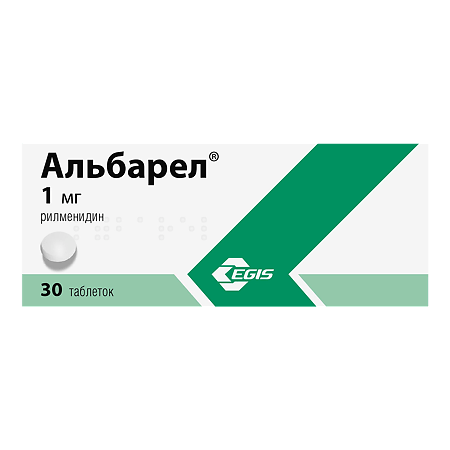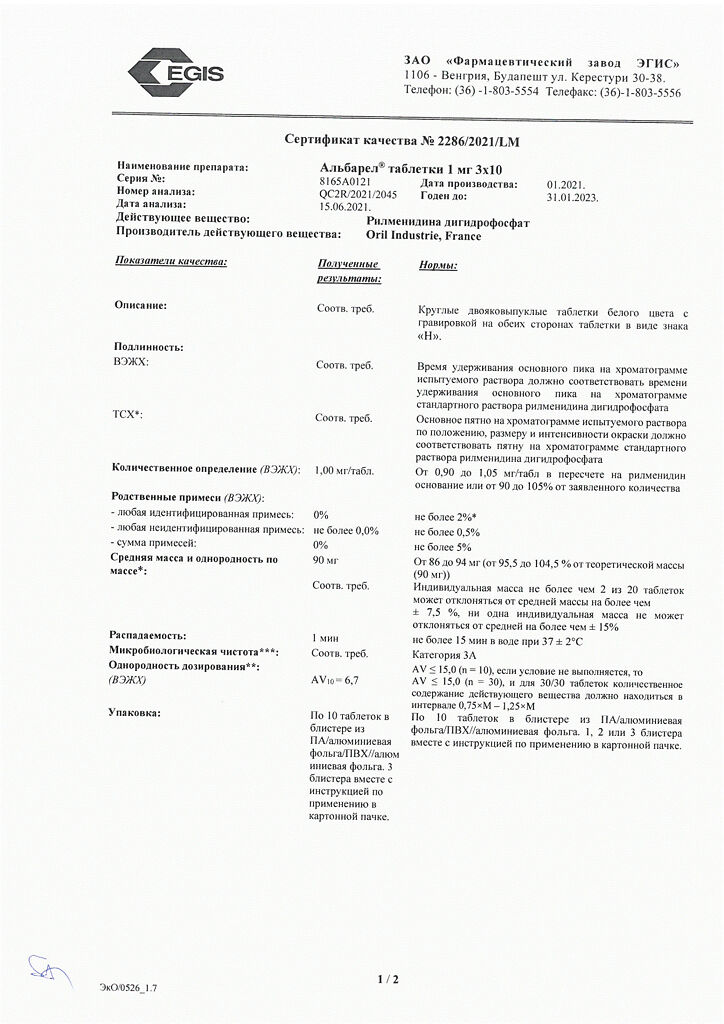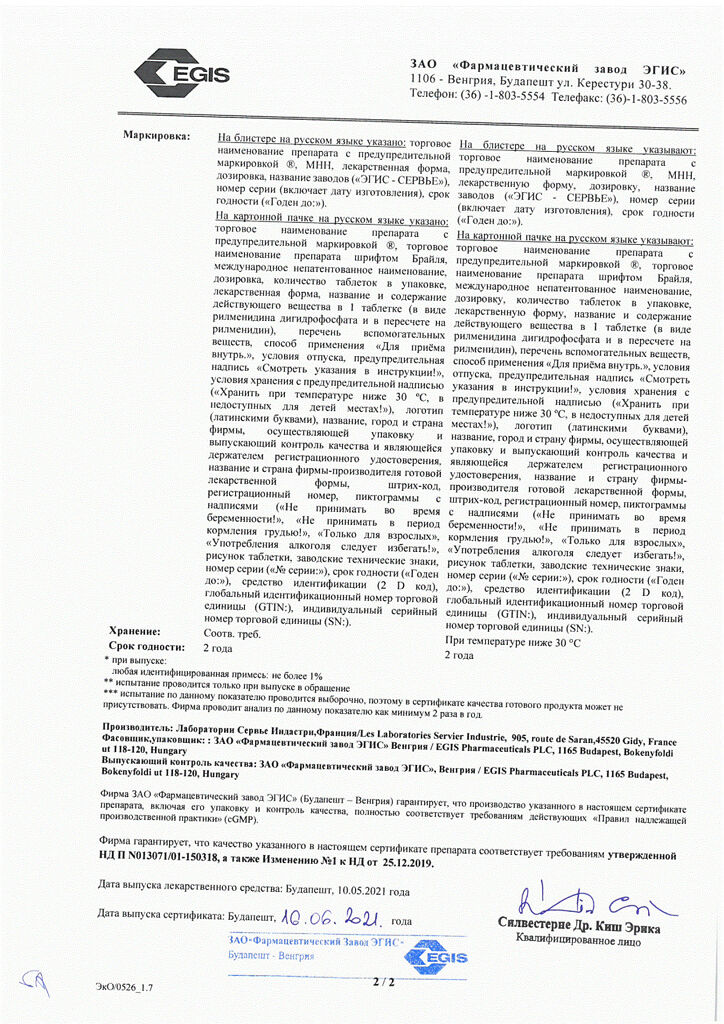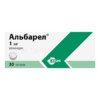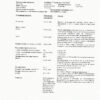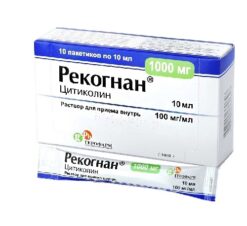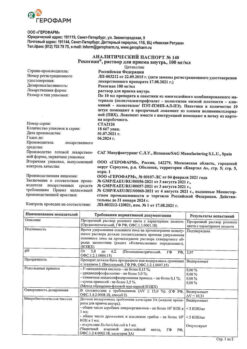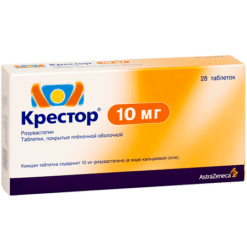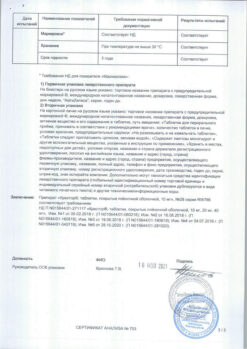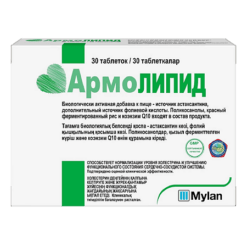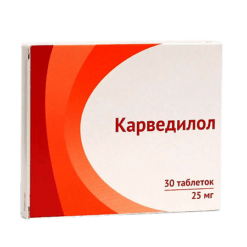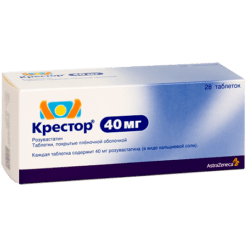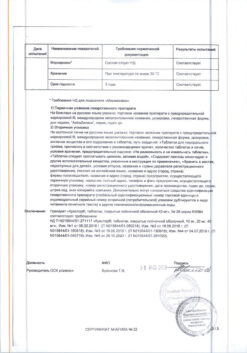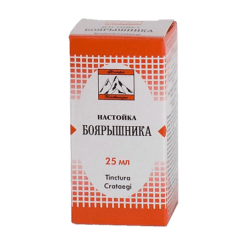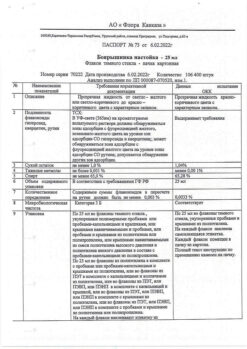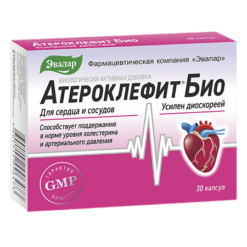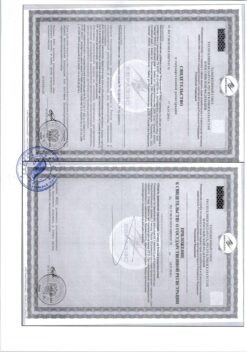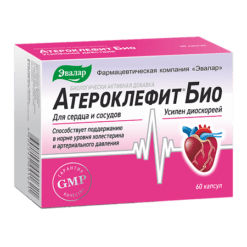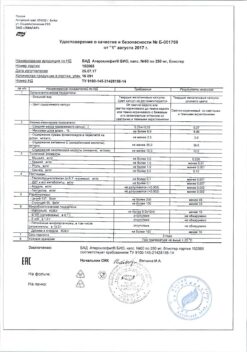No products in the cart.
Albarel, tablets 1 mg 30 pcs
€31.29 €26.07
Out of stock
(E-mail when Stock is available)
Description
Pharmacodynamics
ALBAREL, an oxazoline derivative, selectively interacts with imidazoline receptors (I1) of brain and peripheral vasomotor structures and kidneys. Binding of rilmenidine to imidazoline receptors (I1) inhibits sympathomimetic activity, which leads to a decrease in blood pressure (BP), by reducing total peripheral resistance.
ALBAREL exhibits dose-dependent hypotensive effects on systolic and diastolic BP in the prone and standing position.
Double-blind placebo-controlled studies and comparative studies with reference drugs have demonstrated the antihypertensive efficacy of ALBAREL at therapeutic doses (1 mg daily in one sitting or 2 mg daily in two sitting) for mild to moderate arterial hypertension. With this dosing regimen, the hypotensive effect was maintained for 24 hours throughout the duration of the study. No attenuation of the hypotensive effect was noted in long-term studies.
In therapeutic doses ALBAREL does not affect cardiac function and does not lead to sodium and water retention.
ALBAREL does not cause orthostatic phenomena, including in elderly persons. It does not interfere with the physiological response manifested by changes in heart rate in response to physical activity.
ALBAREL does not affect renal blood flow, glomerular filtration or filtration fraction.
ALBAREL has no effect on carbohydrate and fat metabolism, including in patients with diabetes types I and II.
Pharmacokinetics
Intake
Intake:
Quickly: maximum plasma concentration (3.5 ng/mL) is reached 1 1/2 to 2 hours after a single dose of 1 mg of ALBAREL;
full: Absolute bioavailability is 100% with no effect of first passage through the liver;
different between patients: no interindividual variation noted.
Simultaneous ingestion does not affect bioavailability using the recommended therapeutic doses.
Distribution
The binding to plasma proteins is less than 10%.
Metabolism
ALBAREL is very poorly metabolized. Metabolites are found in trace amounts in the urine and are the result of hydrolysis or oxidation of the oxazoline ring. These metabolites do not bind to alpha-2 adrenoreceptors.
Elimation
ALBAREL is mainly excreted via the kidneys: 65% of the administered dose is excreted unchanged in the urine. Renal clearance represents two-thirds of total clearance.
The elimination half-life is 8 hours. It does not change with repeated administration. The duration of the pharmacological effect is longer; the hypotensive effect is significantly maintained for 24 hours after administration of ALBAREL at a dose of 1 mg per day.
After repeated administration
Plasma concentration stabilization is achieved from the third day of regular drug administration and is maintained at the same level thereafter.
Long-term monitoring of plasma levels
In patients with arterial hypertension who have been treated for 2 years, plasma concentrations of ALBAREL remain stable.
In elderly patients
Pharmacokinetic studies in patients aged 70 years and older have shown a half-life of 13+/-1 hours.
In patients with impaired liver function
The half-life is 12+/-1 hours.
In patients with impaired renal function
Because excretion of ALBAREL is primarily renal, these patients have slower drug excretion which correlates with the creatinine clearance value. In patients with severe renal insufficiency (creatinine clearance less than 15 ml/min) the elimination half-life is approximately 35 hours.
Indications
Indications
Arterial hypertension.
Pharmacological effect
Pharmacological effect
Pharmacodynamics
ALBAREL, an oxazoline derivative, selectively interacts with imidazoline receptors (I1) of the brain and peripheral vasomotor structures and kidneys. The binding of rilmenidine to imidazoline receptors (I1) inhibits sympathomimetic activity, which leads to a decrease in blood pressure (BP) by reducing total peripheral resistance.
ALBAREL exhibits a dose-dependent hypotensive effect on systolic and diastolic blood pressure in the supine and standing positions.
Double-blind, placebo-controlled studies and comparative studies with reference drugs revealed the antihypertensive effectiveness of ALBAREL at therapeutic doses (1 mg per day in one dose or 2 mg per day in two doses) in mild to moderate arterial hypertension. With this dosing regimen, the hypotensive effect persisted for 24 hours throughout the study. In long-term studies, no weakening of the hypotensive effect was observed.
In therapeutic doses, ALBAREL does not affect cardiac function and does not lead to sodium and water retention.
ALBAREL does not cause orthostatic phenomena, including in elderly people. It does not interfere with the physiological response manifested by changes in heart rate in response to exercise.
ALBAREL does not affect renal blood flow, glomerular filtration or filtration fraction.
ALBAREL does not affect carbohydrate and fat metabolism, including in patients with diabetes mellitus types I and II.
Pharmacokinetics
Suction
Absorption occurs:
quickly: maximum plasma concentration (3.5 ng/ml) is achieved 1 1/2 – 2 hours after a single dose of ALBAREL at a dose of 1 mg;
completely: absolute bioavailability is 100% without first-pass effect through the liver;
the same in different patients: no interindividual changes were noted.
Concomitant food intake does not affect bioavailability when using recommended therapeutic doses.
Distribution
Plasma protein binding is less than 10%.
Metabolism
ALBAREL is very poorly metabolized. Metabolites are found in trace amounts in urine and are the result of hydrolysis or oxidation of the oxazoline ring. These metabolites do not bind to alpha-2 adrenergic receptors.
Removal
ALBAREL is mainly excreted through the kidneys: 65% of the dose taken is excreted unchanged in the urine. Renal clearance represents two-thirds of the total clearance.
The half-life is 8 hours. It does not change when reassigned. The duration of the pharmacological effect is longer, the hypotensive effect is significantly maintained for 24 hours after taking ALBAREL at a dose of 1 mg per day.
After reappointment
Stabilization of plasma concentration is achieved from the third day of regular use of the drug and remains at the same level subsequently.
Long-term monitoring of plasma levels
In patients with arterial hypertension who have been treated for 2 years, the plasma concentration of ALBAREL remains stable.
In elderly patients
Pharmacokinetic studies in patients aged 70 years and older showed an elimination half-life of 13+/-1 hours.
In patients with liver failure
The half-life is 12+/-1 hours.
In patients with renal insufficiency
Since the elimination of ALBAREL is primarily renal, in such patients there is a slower elimination of the drug, which correlates with the magnitude of creatinine clearance. In patients with severe renal impairment (creatinine clearance less than 15 ml/min), the half-life is approximately 35 hours.
Special instructions
Special instructions
For patients who have recently suffered a stroke or myocardial infarction, the administration of ALBAREL requires periodic medical monitoring. During treatment with ALBAREL, drinking alcohol is not recommended. In case of insufficiency of renal function, if creatinine clearance is more than 15 ml/min, no dose adjustment is required.
Due to the lack of sufficient clinical data, ALBAREL should not be prescribed to children.
Impact on the ability to drive vehicles and operate machines
Double-blind, placebo-controlled studies did not show any effect of ALBAREL at therapeutic doses on psychomotor status. If the drug is prescribed in larger than therapeutic doses or in combination with drugs that depress the activity of the central nervous system, drivers and operators should be warned about the possibility of drowsiness.
Active ingredient
Active ingredient
Rilmenidine
Composition
Composition
1 tablet contains:
Active ingredient:
rilmenidine 1 mg;
Excipients:
sodium carboxymethyl starch – 4.5 mg;
MCC – 33.646 mg;
lactose – 47 mg;
solid paraffin – 0.155 mg;
colloidal silicon dioxide anhydrous – 0.23 mg;
magnesium stearate – 0.9 mg;
talc – 2 mg;
white beeswax – 0.025 mg
Pregnancy
Pregnancy
During pregnancy: ALBAREL is contraindicated in pregnant women, although no teratogenic or embryotoxic effects were observed in animal experiments.
During breastfeeding: since ALBAREL is excreted into breast milk, its use is not recommended during breastfeeding.
Contraindications
Contraindications
Hypersensitivity to the drug
Severe depression
Severe renal failure (creatinine clearance less than 15 ml/min)
Side Effects
Side Effects
Side effects are rare.
They are usually mild and transient: asthenia, palpitations, insomnia, drowsiness, increased fatigue during exercise, epigastric pain, dry mouth, diarrhea, skin rash and, in exceptional cases, cold extremities, orthostatic hypotension, fear, depression, itching, peripheral edema, cramps, nausea, constipation and hot flashes.
Interaction
Interaction
Co-administration of ALBAREL with MAO inhibitors is not recommended.
Prescribing ALBAREL with tricyclic antidepressants reduces its antihypertensive effect.
Overdose
Overdose
If a large amount of the drug is taken, the expected symptoms may be: severe arterial hypotension, mental disorders. In addition to gastric lavage, sympathomimetic agents can be used.
ALBAREL is poorly excreted by hemodialysis.
Storage conditions
Storage conditions
At temperatures below 30 °C
Shelf life
Shelf life
2 years
Manufacturer
Manufacturer
Servier Industry Laboratories, France
Additional information
| Shelf life | 2 years |
|---|---|
| Conditions of storage | At temperatures below 30 °C |
| Manufacturer | Servier Laboratories Industry, France |
| Medication form | pills |
| Brand | Servier Laboratories Industry |
Related products
Buy Albarel, tablets 1 mg 30 pcs with delivery to USA, UK, Europe and over 120 other countries.

